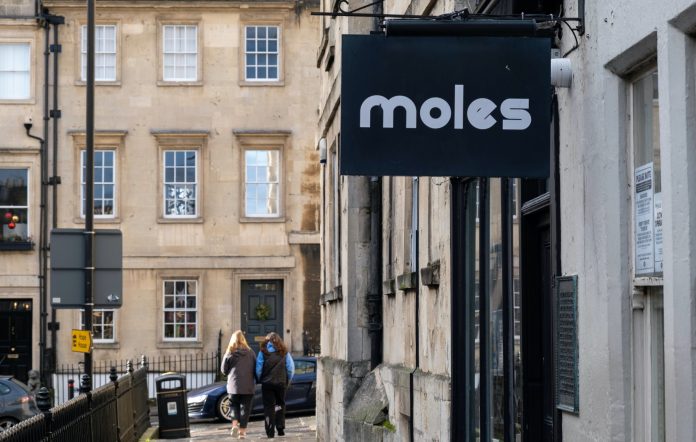
The Music Venue Trust (MVT) has criticised Bath and North East Somerset Council for rejecting a community plea to save legendary venue Moles.
Last December saw Moles in Bath shut its doors for the final time. In a statement, bosses cited the cost of living crisis and “huge rent rates, along with massively increased costs on everything from utilities to stock” as reasons for its closure.
The 220-capacity venue and nightclub opened in 1978 and was one of the last surviving gig spaces from Oasis‘ first tour. Other notable acts to have graced the stage there include Ed Sheeran, Blur, Fatboy Slim, The Killers, Radiohead and The Smiths.
Responding to the closure, the MVT said Moles was another “casualty of a music industry that’s lost touch”. A report published the following month showed the “disaster” that struck the UK’s grassroots venues in 2023 – with 125 of them shutting down across the nation last year (approximately two per week).
The local community subsequently submitted an application to grant Asset Of Community Value status to Moles, but this has now been rejected by the council. Posting on social media yesterday (April 3), the MVT wrote that it was “saddened” by the decision.
Per Planning Aid England, a “building or other land” is defined as an Asset Of Community Value “if its main use has recently been or is presently used to further the social wellbeing or social interests of the local community and could do so in the future”.
“Once listed, if an Asset Of Community Value comes up for sale, the community have an opportunity to make a bid to purchase the asset,” the description notes.
The MVT’s statement continued: “We believe the council’s position that Moles was not of value to the local community and did not contribute to the social wellbeing of Bath residents to be in error.
“Unfortunately, the only people able to undo that error are the councillors who have made it, and we therefore see no available route to an appeal.”
The message went on: “A comprehensive plan to bring Bath Moles back into operation which had been brought together by the local community, key stakeholders and Music Venue Trust cannot be taken forward as a result of this decision. Consequently the venue joins too many others across the country in being permanently lost.”
The MVT concluded: “There is little purpose in government legislation intended to protect highly cherished cultural spaces such as Bath Moles if the decision making to enact such powers is devolved to local councils who refuse to understand the value of live music in our towns and cities.”
Moles owner Tom Maddicott – who also has a Project Support role at the MVT – shared a statement online too, writing: “Very sad to announce that Bath and North East Somerset Council have put an end to any hope of reviving Moles.”
He continued: “A group of passionate locals had applied for the venue to be given Asset Of Community Value status. This would have given the venue some protection in the event of the building being sold and was the first step in the Music Venue Trust’s manifesto for Moles that showed a way for it to come back. Without it there is no chance.
“Everyone on Bath council who voted against this should be ashamed of themselves. They have essentially said that not only was it not of cultural importance to the city but also that live music in general has no value to the community and has no impact on social wellbeing.”
Maddicott told his followers that he’d previously had “a small glimmer of hope that we might be able to do something to bring Moles back but this is really the final nail in the coffin”.
He added: “It probably won’t make much difference but if you are as angry as I am at this and you live in or around Bath please write to your local councillor and let them know how you feel #ripmoles.”
NME has contacted Bath and North East Somerset Council for comment.
Speaking to NME last December, Maddicott explained how the end of Moles was “quite sudden” after trade “dropped off”.
But he said it was “totally possible” for venues like Moles to remain in operation if the music industry adopted the suggested ‘Premier League’ model as UK football does – where the upper echelons pay back and invest in the grassroots.
“If that was in place, then we wouldn’t be in this situation,” he argued. “In France, it’s compulsory for a 3.5 per cent levy on all arena and above tickets. If that was in place here, then Moles wouldn’t be closed. We wouldn’t be losing money and we’d be able to afford to put new artists on.”
Maddicott told NME: “MVT have been asking the industry to sort this out for years, and they haven’t done it. Now is the time. Maybe we need to go to government and get it enforced before we lose any more venues.”
There have been increasing calls for a ticket levy on larger arena and stadium shows in the UK, and a push for investment from the wider industry to save grassroots venues from closure.
In January, MVT CEO Mark Davyd said: “If the big companies in this industry don’t get their act together, then hundreds of venues will close. And guess what? They didn’t get their act together and hundreds of venues have closed. So, I’m afraid you are now going to have to answer for this.”

Responding to Live Nation reporting its biggest year ever for concert turnout and ticket sales in February, Davyd argued that “all 125” of the affected UK grassroots venues “could have been saved for somewhere in the region of £3million; about $3.8million”.
“That’s just 0.06 per cent of Live Nation’s additional revenue this year,” he continued. “Not their total revenue, their additional revenue.
“That is the additional revenue Live Nation made in the year those venues closed down […] And even if you show them these maths they still insist that a sustainable grassroots sector is an unaffordable financial burden on the industry.”
He added: “The economic maths of the live music industry is completely bonkers and it cannot possibly continue.”
Artists and figures from the live music industry recently headed to Parliament to make the case to the UK government that there should be a mandatory £1 ticket levy on all gigs arena-sized and above.
Davyd told the hearing: “The closure of a space like Bath Moles obviously has a huge impact on the pipeline, but it also has a huge impact on Bath as a music city.
“We need to recognise that across the country, we are seeing young people, communities of music fans, finding new music and live music further and further away from them.”
Last October, the Music Venue Trust announced that it had bought its first venue under its public ownership scheme.

The Libertines have revealed that they’ve bought the bathtub that Jim Morrison died in for their Margate hotel, The Albion Rooms.
The band released their fourth album ‘All Quiet On The Eastern Esplanade’ last Friday (April 5), marking their first full-length record in almost a decade. It is currently on course to hit Number One in the UK.
During a new interview with Matt Wilkinson on Apple Music 1, Pete Doherty and Carl Barât talked about achieving their “dream” of opening their own Libertines hotel and studio space in 2020.
“We’ve also got the bathtub that Jim Morrison died in, which we’re going to be putting in one of the rooms,” Doherty explained at one point in the chat.
The frontman of The Doors passed away in Paris in 1971 aged 27. He was found dead in the bathtub of the apartment he was staying in, with the official cause of death being ruled as heart failure. Due to French law, however, no autopsy was carried out as no foul play was suspected at the time.
Doherty continued: “There’s a fellow who my wife’s cousin knows, and his cousin was basically the landlord. And he’s not interested in music, and even less interested in music mythology, and so he’s just been going on about this bathtub which people have been trying to buy off him.
He added: “And so I said to Carl – and obviously, Carl’s known me for years, knows I do have a tendency to exaggerate and… well, lie – but this one is the bang honest truth and it’s actually there.”
The revelation came after Barât explained that he had purchased another piece of rock memorabilia: Jimi Hendrix‘s coat. “Someone convinced me to buy it in an auction. It was going cheap,” the musician said.
“It was because there was about to be a movie come out and André 3000 was playing Jimi Hendrix [in 2013’s Jimi: All Is By My Side], and it was going to really revitalise the Hendrix estate and all of the sort of bric-a-brac…”
Elsewhere in the conversation, Barât explained: “We set up this hotel with grand ambitions and a lot of objectives of which we achieved.
“Now, personally, being very close to it and having to deal with a lot more of the runnings and whatnot, I think we’ve done that. And I think what we really need is a studio where the artists can stay there. We don’t have to shove them down the road.”

Barât gave NME a tour of The Albion Rooms in Margate when it first opened its doors. “The band live in three different countries, and the only thing that really binds us without something like this is tour schedules,” he said at the time.
“To have a place that’s our own HQ and that we all have equal ownership of and equal input in – that was the dream.” You can revisit the video tour and interview above.
The Libertines would go on to record ‘All Quiet On The Eastern Esplanade’ at The Albion Rooms.
Doherty told NME last October: “The other albums were basically written before we went in the studio. This time it was a case of people presenting really strong ideas, and then everyone else just tucking in, putting their bibs on, rolling up their sleeves and chewing the fat.
“There were so many times on this album where I thought I knew what the song was, and then it became completely different for the best.”
In a four-star review of ‘…Eastern Esplanade’, NME praised the band for “find[ing] their voice again”, adding: “For the first time in over 20 years, The Libertines feel like a band with a viable future.”
The Libertines recently added more shows to their 2024 UK and Ireland headline tour. Find any remaining tickets here.